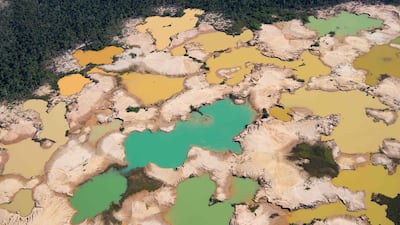Most big companies are failing to report the damage their operations are doing to forests despite committing to lightening their footprint in tackling climate change, a report published on Tuesday said.
CDP, a charity that says it works with institutional investors with assets of $96 trillion (Dh352.63tn), said 70 per cent of 1,500 large companies failed to provide data on their impact on forests in response to its queries last year.
"The silence is deafening when it comes to the corporate response to deforestation," said Morgan Gillespy, global director of forests at CDP, which was formerly known as the Carbon Disclosure Project.
"Consumers increasingly want to know that their shopping basket isn’t driving the destruction of the Amazon, extinction of the orangutans and the climate crisis."
CDP has emerged as a leading voice in a broader push by investors seeking disclosure from companies on the risks they may face as global warming exposes them to extreme weather, supply chain collapse and other forms of disruption.
Since 2014, the charity has also asked companies to report on their impact on forests in terms of timber, palm oil, cattle and soy farming, as part of a growing recognition of the role forests play in preserving species and stabilising the climate.
Of the 306 companies that did report data, 24 per cent showed no or limited action to reduce deforestation, despite brand damage, CDP said.
It named French beauty brand L'Oreal and German consumer goods maker Beiersdorf as the leaders in seeking sustainable sources of palm oil.
But it warned by far most companies were not moving fast enough to try to preserve forests.
Underscoring the slow progress, trader Cargill said last month that it and the broader food industry would fail to meet a 2020 goal to end deforestation, while pledging to do more to protect forests and native vegetation in Brazil.
That followed data that showed deforestation of the Amazon rainforest in Brazil, a top supplier of soybeans to the company, sped up in May to the fastest rate in a decade.
Some companies CDP said had failed to respond to its questions on forests have claimed to be committed to greater sustainability.
British clothing chain Next, for example, said it had completed the CDP climate questionnaire for many years, and had laid out a commitment to source 100 per cent of its timber from responsible or certified sources by 2025.

